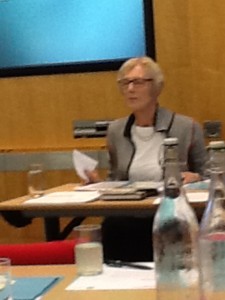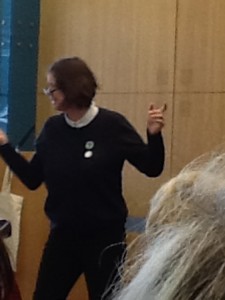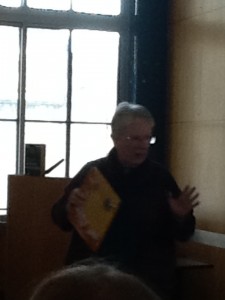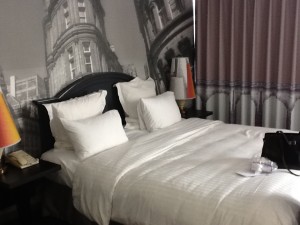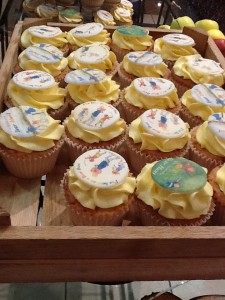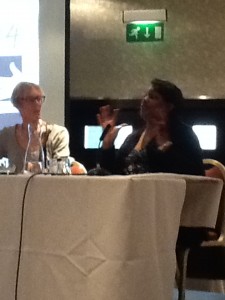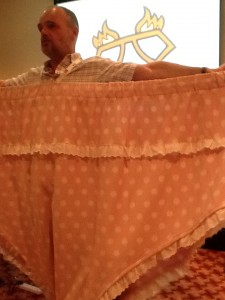Thank you to the School Library Association for a really wonderful day about the importance of reading for pleasure. Most of the delegates appeared to be school librarians and hence already convinced of the importance, I hope that the conference gave them the evidence to go back and convince their senior managers as well. We had a great selection of speakers, some I have heard before but others were new to me, even if I had read some of their work before.
We began the day with the inspirational Wendy Cooling talking about how we enthuse children from a very early start, i.e. birth and how reading is a “head and heart activity”. Reading to babies gives them the sounds and rhythms of speech, even though they don’t know the word and they need access to a wide range of books, which is why families should join the library as early as possible. As librarians we should be modelling the act of reading – showing the parents how we do it, so that they are not self conscious about it, and of course enthusiasm is a wonderful thing. Books can transport us to another world and they can change our lives. The process of reading is like a winding road, easy and difficult in turn and boys especially can be put off when it gets difficult. Wendy felt that all headteachers should have a book on their desk (to make the pupils inquisitive) and we need to make children aware of the possibilities. She highlighted three things we should be doing for schools libraries
Share book knowledge with pupils and parents
Have ‘important’ picture books in secondary schools to remind pupils of when they loved books and stories
Signpost the library well (e.g. footsteps on the floor, poems in the loos)
The second speaker was Dr Clare Wood from the University of Coventry and she was talking about reading research and insights into achievement . This was a more academic talk and dealt with the issues that people find in learning to read. She highlighted three sections
speech, rythmn and reading
comprehension
fluency and decoding skills speed
It seems that many with reading difficulties have problems in ‘hearing’ speech rythmns and that this lasts into adulthood. Some of these issues can be addressed in school, especially through specific small group work focusing on stress/intonation and timing. Clare mentioned several areas that can be useful in improving outcomes. These were technology and literacy, digital communication and reading groups. She spoke about a project that she had undertaken with the Reading Agency and the fact that schools seemed to prefer it as part of the curriculum, rather than as an extra-curricular activity. She finishes her session by saying that the librarian needs to be VISIBLE to the children.
the morning finishes with Karen Goulding from the University of Reading talking about how to create a reading space. this was based on work she had done at Reading University and highlighted the need for the library to be accessible to all, so that they facilitate the “presence, participation and achievement” of the users. She felt that there were 6 elements that needed to be considered
Staff training, to include expertise, perception
New ways to engage
resources
Environment
Communication
This session would have been very useful for those with no background in libraries, but it did confirm that those of us who have been around for a while are still thinking along the right lines.
After lunch we split up into a series of workshops led by such experts as John Vincent leading on LGBTQ support, Sue Dixon on thinking skills and Prue Goodwin on Creating Readers. I attended the latter, although I would have like to go to all three, however as I am not Hermione Granger I do not have an aid to turn back time. Prue reminded us that reading for Pleasure is now implicit in the curriculum and on page 13 it states ” develop their love of literature through widespread reading for enjoyment.” She talked about the pleasures of getting lost in a book and asked for ideas from the group, these included:
fascinated by information
talking to other readers
being inspired by books
being absorbed by the narrative
an exciting challenge
attachment to a specific text – for life
As always Prue was inspiring and full of enthusiasm for reading and it is something that we need to be able to do in order to bring reading alive for the next generation.
The aftenoon was completed by a plenary session from Marilyn Mottram, the HMI Deputy National Lead for English and Literacy. this was particularly useful as she spoke about the responsibilities of OFSTED and those areas that are for the goverment. We did get confirmation that reading for pleasure does appear in the handbook and it is something that schools need to be working with. She said that reading was “more than a cognitive act, it exposes hildren to other worlds, languages and information” It is important that teachers are also readers. there is a need for schools to develop policies around reading as few of them have a clear policy on how students become readers.There also needs to be more effective CPD for staff. She spoke about many of the challenges around encouraging reading, who sets the programmes and closing the gap for PP pupils.
Documents that were quoted included “Reading by Six” and “English at the Crossroads”.
This really turned out to be a very stimulating day with lots to think about and many ideas to bring home and try and put into practise. The problem really is in bringing all of this to the wider audience and making them understand that this is not optional but actually a fundamental part of trying to improve literacy and learning at all levels.
You can find papers from the conference on the SLA website at this address.
http://www.sla.org.uk/reading-for-excellence-sla-one-day-conference.php#sn3128

